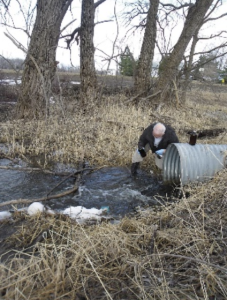
(Submitted by WAG member Chris Mifflin)
Golf courses are known for having perfect, weed-free turf. But this perfection comes at a price. Many kinds of grass on our local golf courses are not native to Ontario and require intense maintenance not only to stay green and lush but to ensure its very survival. If left unmanaged, they quickly succumb to fungal diseases, insect predators, or are overtaken by weeds, local grasses and plants.
To maintain their pristine condition, our local golf courses use pesticides – fungicides, herbicides, and insecticides. Thirty-one different “Unlisted Pesticides” (formerly known as Class 9 pesticides) were used in 2022. The Pesticide Act permits their use on golf courses, but all are toxic to aquatic life if applied incorrectly. When applied to golf course turf, pesticides can migrate to ponds, groundwater, and nearby streams and ditches, killing off native aquatic and insect life.
There are seven (7) golf courses in the Blue Mountain watershed, 4 public courses – Batteaux Creek, Cranberry, Duntroon Highlands, and Monterra and 3 private golf courses including Georgian Bay, Blue Mountain, and Oslerbrook. The key findings from our 2022 golf course testing show that total pesticide use (kg) decreased by 3% versus 2021 to 1,401 kg/year, but this is not as good as the ~8% decrease in 2020. Fungicides are consistently the largest type of pesticide used – 85% by kg applied. The three (3) private golf courses apply 68% of all pesticide by weight (kg).
Since 2008, the Watershed Trust has been regularly conducting sampling of water runoff from area golf courses and documenting our findings. We have contacted Environment Canada as well as the Ontario MECP to voice our concerns and to present our key recommendations. We continue to communicate with federal and provincial authorities, including the relevant Conservation Authorities (NVCA and GSCA) with the intention of improving the legislative framework around pesticide use and its impact on surface water quality.
You can help. If you are a golfer, talk to your Golf Course Superintendent about their pesticide use – encourage them to take up more sustainable and best practice turf management practices!


